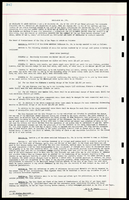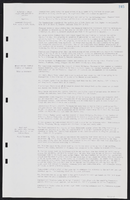Search the Special Collections and Archives Portal
Search Results
Milton Norman Photograph Collection
Identifier
Abstract
The Milton Norman Photograph Collection (1943-1970) consists of black-and-white photographic prints and negatives taken by City of Las Vegas Code Enforcement officer Milton Norman. The images were recorded as part of a survey of substandard residential dwellings built in the then racially segregated communities of the Westside and Vegas Heights in Las Vegas, Nevada.
Archival Collection
Junior League of Las Vegas' Records on the Morelli House Preservation Project
Identifier
Abstract
The Junior League of Las Vegas' Records on the Morelli House Preservation Project contains the records of the Junior League of Las Vegas and the organization's efforts to preserve the Morelli House in downtown Las Vegas, Nevada from 1997 to 2017. Records are comprised of various internal and external planning documents, research files, advertising and publicity, correspondence, grant files, and photographs. Also included in this collection are scans of original planning documents and drawings used by Las Vegas, Nevada architect, Hugh E. Taylor, during construction of the Morelli House in the 1950s.
Archival Collection








